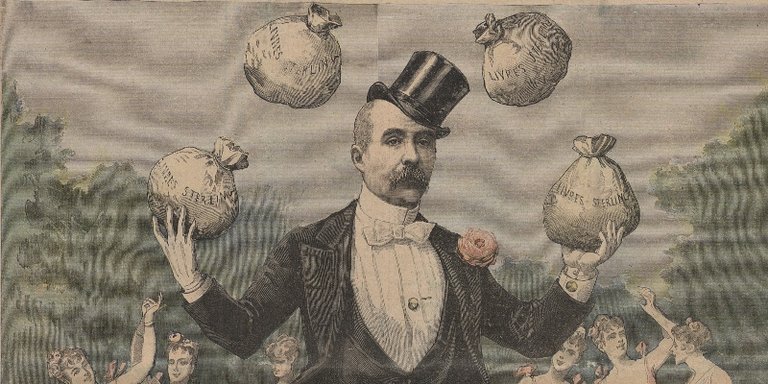
Image Source: https://lithub.com/on-big-techs-moligopolists-the-21st-centurys-robber-barons/
Although this video was very interesting and had lots of historical context, I had to do some other research to learn more about the robber barons and what they actually did wrong. While watching the video, I mostly thought about what the government was doing wrong, not the subsidized entrepreneurs. The subsidized entrepreneurs, like Collins and the different railways, made some unwise decisions and were not acting as efficiently as market entrepreneurs, but I wanted to find some more information.
Notorious Robber Barons
From what I found, robber barons were entrepreneurs or businessmen who achieved their wealth in unethical ways. Some examples of this are “employee or environmental abuse, stock market manipulation, or deliberately restricting output to charge higher prices” (Kenton). These robber barons were primarily involved in the industrial business, such as the steamships and railroads that Dr. Folsom referred to. These are the two robber barons that I had more interest in after looking into some of the most notorious.
James Fisk
A perpetrator of stock market manipulation was James Fisk. He allegedly smuggled cotton during the Civil War and invested the proceeds into Confederate bonds. When he learned that the Confederates were going to be defeated, he sold his bonds as quickly as possible before other investors knew about the situation. He also was involved in the bribery of judges and legislatures, as well as the Black Friday of the stock market in 1869, which ruined many investors (“James Fisk: A Bigger than Life Figure in the Gilded Age”). His actions contradict the entrepreneurial principles of free exchange, power balance, and alignment of incentives. By smuggling goods and having an inside knowledge of the Confederate defeat, Fisk was committing fraud and coming to his fortune in unethical ways. This disrupts the principle of free exchange. His manipulation of legislatures and judges contradicted the power balance and the alignment of incentives. When people in power accept bribes or money from businessmen in exchange for an unfair advantage, they make it unfair for market entrepreneurs to distribute their own products fairly.
John Rockefeller
Rockefeller is one of the most notorious robber barons who operated in the United States. His company, Standard Oil, used unfair techniques to achieve a monopoly on oil refining. Rockefeller threatened other refiners to sell their businesses to Standard Oil, cut off the flow of oil to refineries that Standard Oil wanted to purchase, and bribed legislatures. In the 1880s, the company controlled approximately 90% of the oil refining business in the United States (Constitutional Rights Foundation). Rockefeller had one of the first powerful, country-wide monopolies. His monopoly contradicted the principles of competitive markets and free exchange. For competitive markets, there were no policies at the time that promoted full and open competition in the marketplace. This allowed Rockefeller to buy out almost all other oil refining companies in the country and push other entrepreneurs out of the market. His monopoly also contradicted free exchange by coercing other companies into selling their businesses. His bribing of legislatures also gave him an unfair advantage. In both of these coercive situations, both parties were not better off and could not exchange freely with Rockefeller and Standard Oil.
After I had a better understanding of robber barons and some of the individuals and companies that were involved in their unethical activities, I felt like I was able to follow Dr. Folsom’s lecture better. This era in history was difficult for market entrepreneurs, especially when the government was giving subsidies to entrepreneurs. As far as I can tell, there never seems like a situation where the government should give subsidies to only one or two companies that they want to help the country increase their competition or profitability. I would like to hear from the class if there are ever situations that they can picture when subsidized entrepreneurs are a better idea for the economy than market entrepreneurs.
Subsidized Entrepreneurs
I think the two major principles that are contradicted by providing subsidies to entrepreneurs are competitive markets and the alignment of incentives. By providing money to certain individuals or companies to develop a product or service, the government provides them with an unfair advantage. Other entrepreneurs that are not given the money or opportunity are missing out on an opening in the market. Providing subsidies allows the government and the subsidized entrepreneur to create a new market where they have an advantage. It is harder for a market entrepreneur to create competition when they are going up against a subsidized entrepreneur who is backed by the government. The subsidizing of entrepreneurs of steamships and railroads created a misalignment of incentives. A large amount of conflict and failure resulted from these subsidies, and they were not really needed. Entrepreneurs are strong enough on their own to find gaps in the market to fill.
Constitutional Rights Foundation. “Rockefeller and the Standard Oil Monopoly.” Crf-Usa.org, 2023, www.crf-usa.org/bill-of-rights-in-action/bria-16-2-b-rockefeller-and-the-standard-oil-monopoly.html#:~:text=In%20the%20end%2C%20Rockefeller%20made,industrial%20monopoly%20in%20the%20world. Accessed 13 Apr. 2023.
“James Fisk: A Bigger than Life Figure in the Gilded Age.” U-s-History.com, 2023, www.u-s-history.com/pages/h865.html. Accessed 13 Apr. 2023.
Kenton, Will. “Robber Barons: Definition, Significance, Criticism, and Examples.” Investopedia, 2 Dec. 2022, www.investopedia.com/terms/r/robberbarons.asp. Accessed 12 Apr. 2023.
Congratulations @mloy0921! You have completed the following achievement on the Hive blockchain And have been rewarded with New badge(s)
Your next target is to reach 20 posts.
You can view your badges on your board and compare yourself to others in the Ranking
If you no longer want to receive notifications, reply to this comment with the word
STOPTo support your work, I also upvoted your post!
Check out our last posts:
Support the HiveBuzz project. Vote for our proposal!